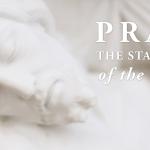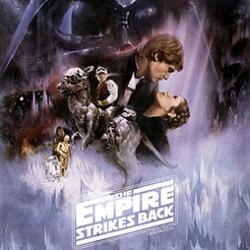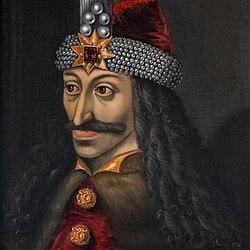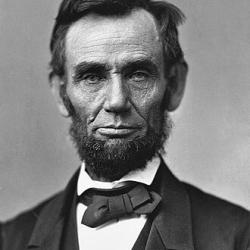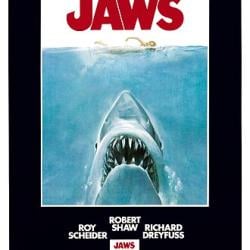As Christians celebrate the Resurrection of Christ, history continued to happen while the priest was raising the host at mass and the Baptist minister was preaching his sermon and the Lutheran choir were singing their hymns.
NOTE: Most of the historical descriptions described are taken verbatim
from Dr. Jimmy and Larry Wikipedia.
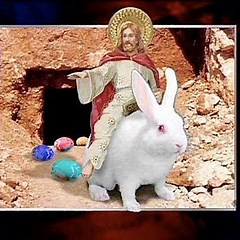
I start my look at history on the mystery of Easter on…
(Easter Sunday) April 8, 1708
The first performance of George Frideric Handel‘s oratorio La resurrezione takes place in Rome.
Great Art is Ecumentical
“Jesus Christ Is Risen Today” was first written in Latin titled “Surrexit Christus hodie“, as a Bohemian hymn in the 14th century by an unknown author on manuscripts written in Munich and Breslau.[2] In Latin, it had eleven verses. It was first translated into English in 1708 by John Baptist Walsh to be included in his Lyra Davidica (Collection of Divine Songs and Hymns).
(Easter Sunday) April 5, 1722
Dutch admiral Jacob Roggeveen (February 1, 1659 – January 31, 1729) lands on what is now Easter Island.
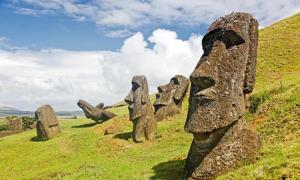
(Good Friday) April 12, 1743
Augustine Washington, father of the future first President of the United States (b. 1694) dies.
Holy Saturday April 13, 1743 -The British East India Company ship Princess Louisa is wrecked off the coast of Maio Island in the Cape Verde Islands, killing 49 of her 179 crew. This is not the last ship to be wrecked in and around Easter. It is not the last disaster where many people perished to happen in and around Easter.
Thomas Jefferson, third President of the United States, author of the Declaration of American Independence (d. 1826) is born.
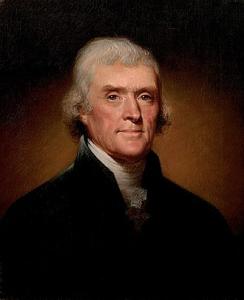
(Easter Wednesday) April 6, 1763
The Théâtre du Palais-Royal, home to the Paris Opera for almost 90 years, is destroyed in an accidental fire. The Paris Opera is the primary opera and ballet company of France. It was founded in 1669 by Louis XIV as the Académie d’Opéra, and shortly thereafter was placed under the leadership of Jean-Baptiste Lully and officially renamed the Académie Royale de Musique, but continued to be known more simply as the Opéra.
Classical ballet as it is known today arose within the Paris Opera as the Paris Opera Ballet and has remained an integral and important part of the company. Currently called the Opéra National de Paris, it mainly produces operas at its modern 2,723-seat theatre Opéra Bastille which opened in 1989, and ballets and some classical operas at the older 1,979-seat Palais Garnier which opened in 1875. Small scale and contemporary works are also staged in the 500-seat Amphitheatre under the Opéra Bastille.
(Easter Wednesday) April 19, 1775
The Battles of Lexington and Concord was the first major military campaign of the American Revolutionary War, resulting in an American victory and outpouring of militia support for the anti-British cause.
(Good Friday) April 18, 1783
Three-Fifths Compromise: The first instance of black slaves in the United States of America being counted as three fifths of persons (for the purpose of taxation), is included in a resolution of the Congress of the Confederation (this is later adopted in the 1787 Constitution).
(Easter Monday) April 2, 1804
Forty merchantmen are wrecked when a convoy led by British frigate HMS Apollo runs aground off Portugal with considerable loss of life.
(Easter Tuesday) April 4, 1804 – English Poet Samuel Taylor Coleridge,(October 21, 1772 – July 25, 1834) aboard The Speedwell, sails to the Mediterranean.
“Water, water, everywhere,
And all the boards did shrink;
Water, water, everywhere,
Nor any drop to drink.”
— Samuel Taylor Coleridge (The Rime of the Ancient Mariner)
Northern Irish painter Andrew Nicholl, (April 4, 1804 – April 16, 1886) is born.
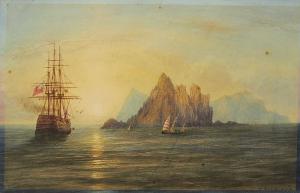
(Easter Wednesday) April 5, 1804 – The High Possil meteorite, the first recorded meteorite to fall in Scotland in modern times, falls at High Possil.
(Easter Sunday) March 22, 1818
Easter Sunday in Western Christianity falls on its earliest possible date. In Western Christianity, it will not occur on this date again until 2285.
John Ainsworth Horrocks, English-born explorer of South Australia (d. 1846). He was one of the first European settlers in the Clare Valley of South Australia where, in 1840, he established the village of Penwortham.
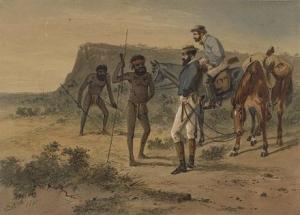
Horrocks first interview (1868) by S. T. Gill
(Easter Monday) April 19. 1824
Lord Byron (January 22, 1788 – April 19, 1824) (George Gordon Byron), the British poet, dies at the age of 36 in the Greek city of Missolonghi, where he had taken ill while making plans to liberate the Greeks from Ottoman rule. In early April he caught a violent cold; the therapeutic bleeding insisted on by his doctors exacerbated it. He contracted a violent fever and died.
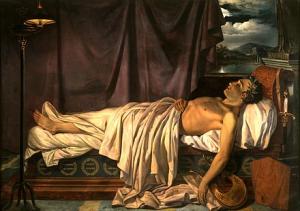
(Easter Sunday) April 14, 1843
Gustave Huberti, Flemish composer (d. 1910) is born. Among his many accomplishments and endeavors he was part of the musical organisation of the World’s Fair of 1885.
JOS ORELIO Dutch baritone (1854-1926)
Pathé record 1912 “Meilied”
composed by Gustave HUBERTI (1853-1910)
(Easter Monday) April 15, 1843 – Henry James, American novelist (d. 1916) is born.
The element of the grotesque was very noticeable to me in the most marked collection of the shabbier English types that I had seen since I came to London. The occasion of my seeing them was the funeral of Mr. George Odger, which befell some four or five weeks before the Easter period. Mr. George Odger, it will perhaps be remembered, was an English radical agitator of humble origin, who had distinguished himself by a perverse desire to get into Parliament. He exercised, I believe, the useful profession of shoemaker, and he knocked in vain at the door that opens but to the refined. But he was a useful and honourable man, and his own people gave him an honourable burial. I emerged accidentally into Piccadilly at the moment they were so engaged, and the spectacle was one I should have been sorry to miss.
The stranger in London is forewarned that at Easter all the world goes out of town, and that if he have no mind to be left to some fate the universal terror of which half allures half appals his curiosity, he too had better make arrangements for a temporary absence. I remember how, when I woke up on Easter Monday and looked out of my window, I found the street covered overnight with a sort of snow-fall of disembarked Britons. They made for other people an uncomfortable week of it. When Easter Monday came it was obvious that every one (save Mr. Odger’s friends—three or four million or so) had gone out of town. There was hardly a pair of shutters in the West End that was not closed; there was not a bell that it was any use to pull. The weather was detestable, the rain incessant, and the fact that all your friends were away gave you plenty of leisure to reflect that the country must be the reverse of enlivening.
-Henry James, English Hours (1905)
(Easter Sunday) April 16, 1854
The United States packet ship Powhattan is wrecked off the New Jersey shore, with more than 200 victims.
(Easter Thursday) April 16, 1857
The works of astronomer Galileo Galilei espousing heliocentrism are removed (with the approval of Pope Benedict XIV) from the Index Librorum Prohibitorum list of books banned by Roman Catholic Church, along with “all books teaching the earth’s motion and the sun’s immobility”. Other works of heliocentrists Galileo, Nicolaus Copernicus, Johannes Kepler, Diego de Zúñiga and Paolo Foscarini remain on the list.
In the wake of public unrest in France, the King’s Council issues a decree that bars anyone from writing, printing anything that would tend toward émouvoir les esprits (stir up popular sentiment) against the government, with violations punishable by death.
(Good Friday) April 14, 1865
Assassination of Abraham Lincoln: President of the United States Abraham Lincoln is shot while attending an evening performance of the farce Our American Cousin at Ford’s Theatre in Washington, D.C., by actor and Confederate sympathizer John Wilkes Booth.
United States Secretary of State William H. Seward and his family are attacked in his home, by Lewis Powell.
(Holy Saturday) April 15, 1865 – President Lincoln dies early this morning from his gunshot wound, aged 56. Vice President Andrew Johnson becomes the 17th President of the United States upon Lincoln’s death and is sworn in later that morning.
(Easter Tuesday) April 18, 1865 – Confederate President Jefferson Davis and his entire cabinet arrive in Charlotte, North Carolina, with a contingent of 1,000 soldiers.
(Monday of Holy Week)
April 15, 1889
Father Damien, Belgian Roman Catholic priest, missionary to Hawaiians with leprosy and saint (b. 1840) dies.
(Holy Tuesday) April 16. 1889 – Charlie Chaplin, English actor, film director (d. 1977) is born.
(Holy Saturday) April 20, 1889 – Adolf Hitler, Austrian-born dictator of Nazi Germany is born.
(Easter Sunday) April 21, 1889 Paul Karrer, Swiss chemist, Nobel Prize laureate (d. 1971) is born.
Saint Mother Cabrini is in New York on this day having arrived during Lent on March 31st on the day that the Eiffel Tower is inaugurated in Paris.
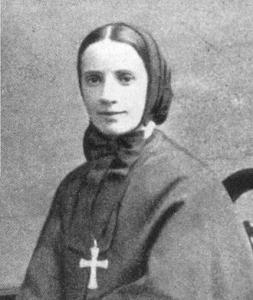
(Easter Monday) April 22, 1889 – At high noon in Oklahoma Territory, thousands rush to claim land in the Land Rush of 1889. Within hours the cities of Oklahoma City and Guthrie are formed, with populations of at least 10,000.
(Easter Sunday) March 25, 1894
Coxey’s Army (of the unemployed), the first significant protest march in the United States, departs from Massillon, Ohio, for Washington, D.C.
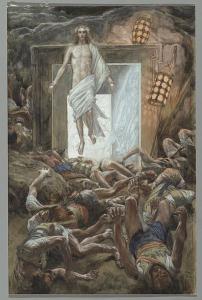
James Tissot (Nantes, France, 1836–1902, Chenecey-Buillon, France).
The Resurrection (La Résurrection), 1886-1894.
Opaque watercolor over graphite on gray wove paper,
Brooklyn Museum
(Holy Saturday) April 11, 1903
Gemma Galgani, Italian mystic, Catholic saint (b. 1878) dies.
(Orthodox Easter Week) April 19–21,1903 -The first Kishinev pogrom, beginning on Orthodox Easter Day, takes place in Kishinev, capital of the Bessarabia Governorate of the Russian Empire. At least 47 Jews are killed and others injured during mob rioting encouraged by blood libel articles in the press and led by priests; no attempt is made by police or military to intervene until the third day.
(Holy Saturday) April 14, 1906
The Azusa Street Revival, the primary catalyst for the revival of Pentecostalism this century, opens in Los Angeles.
(Easter Wednesday) April 18, 1906 – The San Francisco Earthquake (estimated magnitude 7.8) on the San Andreas Fault destroys much of San Francisco, California, killing at least 3,000, with 225,000–300,000 left homeless, and $350 million in damages.
Xerox, the global digital office machine brand, is founded in Rochester, New York as the Haloid Photographic Company.
The Birth, the Life and the Death of Christ (French: La vie du Christ) directed by Alice Guy-Blaché is released. The sets and costumes designed by Victorin Jasset and Henri Menessier and were inspired by engravings by James Tissot the painter.
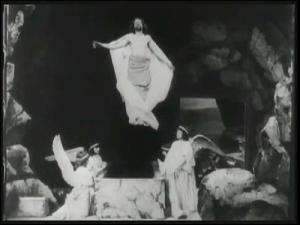
(Easter Sunday) March 27, 1910
A fire during a barn-dance in Ököritófülpös, Hungary, kills 312 people after ballroom decorations catch alight.
Hugh Nibley, American scholar and Latter-day Saint apologist (d. 2005) is born.
(Easter Wednesday) April 10, 1912
White Star liner RMS Titanic departs from Southampton, England, with more than 2,200 passengers and crew on her maiden voyage, bound for New York.
(Easter Thursday) April 11, 1912– RMS Titanic makes her last call, at Queenstown in Ireland.
April 14–15– Sinking of the RMS Titanic: RMS Titanic strikes an iceberg in the northern Atlantic Ocean and sinks with the loss of more than 1,500 lives. The wreck is not discovered until 1985.
(Easter Monday) April 24,1916 –
(Divine Mercy Sunday) April 30, 1916
The Easter Rising occurs in Ireland. Members of the Irish Republican Brotherhood proclaim an Irish Republic, and the Irish Volunteers and Irish Citizen Army occupy the General Post Office and other buildings in Dublin, before surrendering to the British Army.
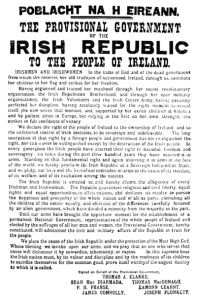
Proclamation of the Irish Republic
distributed during the Easter Rising
(Good Friday) April 10, 1925
Scott Fitzgerald publishes his novel The Great Gatsby in New York.
(Easter Wednesday) April 15, 1925– Fritz Haarmann, a serial killer convicted of the murder of 24 boys and young men, is guillotined in Germany.
(Easter Sunday) April 17, 1927
João Ribeiro de Barros becomes the first non-European to make a transatlantic flight, flying from Genoa, Italy, to Fernando de Noronha, Brazil.
Coretta Scott King, African-American civil rights leader, wife of Rev. Dr. Martin Luther King Jr. (d. 2006) is born.
(Easter Wednesday) April 19, 1927 – Cecil B. DeMille‘s The King of Kings is is released on
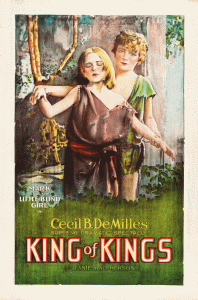
(Easter Monday) April 17, 1930
A fire in the Ohio Penitentiary in Columbus, United States kills 320 people.[16]
The Turkestan–Siberia Railway is completed.
(Easter Tuesday) April 22, 1930 – The United Kingdom, Japan and the United States sign the London Naval Treaty to regulate submarine warfare and limit naval shipbuilding.
Albert Henry Ross ( January 1, 1881 – 14 September 14, 1950), (pseudonym Frank Morison), was an English advertising agent and freelance writer known for writing the Christian apologetics book Who Moved the Stone? (1930)
We are therefore very amply within the field of historic probability when we picture this little party of three or four women approaching the tomb in the dim dawn of Sunday morning. But this is not the only fact recorded in the Gospels that looms solid and very real through the mists of time. I mean the preoccupation of the women with the difficulties they were likely to experience with the stone that, according to all the documents, was placed against the entrance to the grave.
The question as to how they were to remove this stone must of necessity have been a source of considerable perplexity to the women. Two of them at least had witnessed the interment and knew roughly how things stood. The stone, which is known to have been large and of considerable weight, was the great difficulty. When, therefore, we find in the earliest record, the Gospel of Mark, the words, “Who shall roll us away the stone from the door of the tomb?” we can hardly avoid feeling that this preoccupation of the women with the question of the stone is not only a psychological necessity of the problem, but a definitely historical element in the situation right up to the moment of their arrival at the grave.
(Easter Weekend) 1937
Robert George Irwin (August 5, 1907 – 1975) was an American artist, sculptor, and recurring mental hospital patient who pleaded guilty to killing three people on Easter weekend in 1937 in the Beekman Hill area of New York City’s Turtle Bay neighborhood.
(Easter Sunday) March 28,1937 – Pope Pius XI published the encyclical Nos es muy conocida about the religious situation in Mexico.
No less grave and no less urgent is another duty: that of the religious and economic assistance of the campesinos (peasants), and in general of that not small portion of your sons forming the population, mostly agricultural, of the Indians. There are millions of souls, they too redeemed by Christ, entrusted by Him to your care and for whom He will some day ask you to render an account; there are millions of individual men often in such sad and miserable living conditions that they have not even that minimum of well-being indispensable to protect their very dignity as men. We conjure you, Venerable Brethren, in the bosom of the charity of Christ to have particular care for these children, to encourage your clergy to devote themselves with ever-increasing zeal to their assistance, and to interest the whole Mexican Catholic Action in this work of moral and material redemption.
(Easter Tuesday) March 30,1937 – – Warren Beatty, American actor and director is born.
(Holy Saturday) April 16, 1938
The Anglo-Italian Agreements of 1938, also called the Easter Pact or the Easter Accords, were a series of agreements concluded between the British and the Italian governments in Rome to facilitate the Italian government’s co-operation in keeping the existing world order and to prevent it from allying with Germany.
The agreements were registered in the League of Nations Treaty Series on March 15, 1939.
(Easter Sunday) April 25, 1943
Easter occurs on the latest possible date (last time 1886; next time 2038) in the Western Christian Church.
(Easter Sunday) April 1, 1945
WWII: Battle of Okinawa: The Tenth United States Army lands on Okinawa.
(Sunday) March 28, 1948
The 2nd Tony Awards were held at the Waldorf-Astoria Hotel in New York City. The Tony Award for Best Play was given out for the first time, won by Mister Roberts.
Easter Parade starring Judy Garland, Fred Astaire, Peter Lawford, and Ann Miller is released after Easter on June 30, 1948. The film contains some of Astaire’s and Garland’s best-known songs, including “Easter Parade“, “Steppin’ Out with My Baby“, and “We’re a Couple of Swells“, all by Irving Berlin.
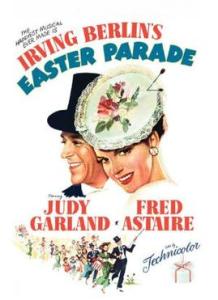
(Easter Sunday) April 9, 1950
The “Notre-Dame Affair” took place during nationally televised Easter High Mass services at the Notre-Dame Cathedral in Paris, when members of the Lettrism movement chose a quiet moment for Michel Mourre to deliver a “blasphemous anti-sermon” that ended with “We proclaim the death of the Christ-God, so that Man may live at last.” The church organist began playing music as loudly as possible to drown out the speech after Mourre had declared, “En vérité je vous le dis: Dieu est mort” (“Verily, I say unto you: God is dead”)
Peter Cottontail
By this time the version of the song “Here Comes Peter Cottontail” performed by cowboy country singer Gene Autry was available for purchase and being played on the radio. It peaked at number 3 on the U.S Billboard Hot Country Singles chart and at number 5 on the Billboard Hot 100 chart. Gene’s other hot holiday hits include Here Comes Santa Claus” and “Rudolph the Red Nosed Reindeer“.
From The Hills of Utah (1951)
(Easter Sunday) April 10, 1955
Philosopher Fr. Pierre Teilhard de Chardin SJ, (May 1, 1881 – 10 April 10, 1955) dies.
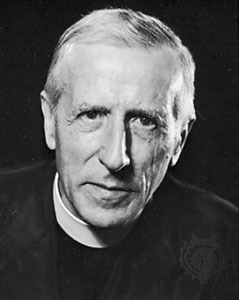
- Since once again, O Lord, in the steppes of Asia, I have no bread, no wine, no altar, I will raise myself above those symbols to the pure majesty of reality, and I will offer to you, I, your priest, upon the altar of the entire earth, the labor and the suffering of the world.
Receive, O Lord, in its totality the Host which creation, drawn by your magnetism, presents to you at the dawn of a new day. This bread, our effort, is in itself, I know, nothing but an immense disintegration. This wine, our anguish, as yet, alas! is only an evaporating beverage. But in the depths of this inchoate Mass you have placed — I am certain, for I feel it — an irresistible and holy desire that moves us all, the impious as well as the faithful to cry out: “O Lord, make us one!”- Prayer for Easter Sunday in the Ordos Desert of Inner Mongolia published in article “The Priest Who Haunts the Catholic World” Saturday Evening Post (12 October 1963)
(Easter Monday) April 11, 1955 – The Taiwanese Kuomintang put a bomb on the airplane Kashmir Princess, killing 16 but failing to assassinate the People’s Republic of China leader, Zhou Enlai.
(Easter Tuesday) April 16, 1963
Martin Luther King, Jr. issues his “Letter from Birmingham Jail“.
Jimmy Osmond, American singer is born.
(Lent) April 4, 1971
Here Comes Peter Cottontail premieres on ABC. It was a stop motion animated tv special brought to you by the good folks at Rankin/Bass Productions that gave us such holiday classics as Rudolph the Red-Nosed Reindeer and Santa Claus Is Comin’ to Town. It uses the song Steve Nelson and Jack Rollins wrote in 1949 and sung by both country legend Mervin Shiner (who was the first person to record the song) and Gene Autry. The special was based on the 1957 novel, The Easter Bunny That Overslept, by Priscilla and Otto Friedrich. The name ‘Peter Cottontail‘ was used by a character in a 1914 Thornton Burgess book, but may not have been previously used to refer to the Easter Bunny.
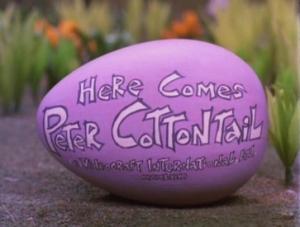
Peter Cottontail is narrated by Danny Kaye, and stars Casey Kasem, Vincent Price, Joan Gardner and Paul Frees. In 2005, it was followed by a computer-animated sequel Here Comes Peter Cottontail: The Movie.
(Easter Sunday) April 11, 1971 – I celebrate my first easter being just a little over 2 months old.
(Holy Monday) April 9, 1974
Easter Sunday was April 14, but on Holy Monday April 9, 1974, the 12th prime-time animated Peanuts TV special It’s the Easter Beagle, Charlie Brown! debuted on CBS on at 8 PM.
We will all do well to prolong spiritually our celebration of Easter in remembrance of our baptism. The relationship between the Paschal Mystery, which Christ celebrated with his Passion, His death and Resurrection, and the sacrament of our Baptism is taught to us by Saint Paul in very clear words in the famous passage of the Letter to the Romans: “Do you not know that all of us who were baptized into Christ Jesus were baptized into his death? we have therefore been buried with him in death by baptism, so that, just as Christ was raised from the dead for the glory of the Father, so we also may walk in newness of life. For if we have been inserted into the likeness of His death, we shall also be inserted into that of the resurrection; knowing this, that our old man was crucified with Him to destroy the body of sin, so that we would no longer be names enslaved to sin . . . In the same way you also reckon that you are dead to sin, and that you live to God in Christ Jesus” (Rom. 6. 3-11).
St. Paul VI- General Audience Easter Wednesday, 17 April 1974
(Easter Sunday) April 10, 1977
Pope Paul celebrated Easter with services at the Vatican. Services were held in St. Peter’s Square; the crowd reached to the banks of the Tiber River. President Carter and his family attended Easter services with their son Jack and his family in Calhoun, Georgia. The Carters had a private sunrise service with Amy and Rosalynn participating. President Carter spoke at a Sunday school session of the Calhoun First Baptist Church. A special midnight movie and television entertainment in Russia didn’t deter large crowds from attending services at Russian and Greek Orthodox Churches. [CBS] News stories from Sunday April 10, 1977 (ultimate70s.com)
British-Italian epic film and television drama serial Jesus of Nazareth directed by Franco Zeffirelli airs on TV March 27 – April 24, 1977.
What Does Being a Christian Mean? The first meaning, in time and importance, is given by the fact that we are made worthy to bear this name, not as a mere sociological qualification (cf. Acts 11:26), but as a vital relationship with Christ, an entrance into the kingdom of God. The first, essential, saving relationship of our life with Christ, who died and rose for us, is established through baptism: “Christ, our Passover, has been sacrificed!” exclaims Saint Paul, as if reaffirming the fundamental canon of religion, which takes its origin and name precisely from Jesus Christ.
This fact is so important in the field of our faith that we would do well to devote particular reflection to it, if we wish that the Easter just celebrated should not pass as any other day, as another feast without emergency in our way of conceiving the Christian life.
PAUL VI
GENERAL AUDIENCE
Wednesday, 13 April 1977
(Easter Sunday) April 7, 1985
Wham! becomes the first Western pop group to perform in China when they play a concert in Beijing‘s Workers Stadium during an historic 10-day visit.
Carl Schmitt (born 1888) dies. He was a German jurist, political theorist, geopolitician and prominent member of the Nazi Party.
(Easter Wednesday) April 10, 1985 – Madonna begins her very first tour, The Virgin Tour (named after her Like a Virgin album) in Seattle, Washington, USA.
(Easter Friday) April 12, 1985 –Ladyhawke opens in theaters.
To the English-speaking faithful
Dear Brothers and Sisters,
I am happy to extend a special Easter greeting to the English speaking visitors and pilgrims. I welcome the newly ordained deacons from the Pontifical Irish College, accompanied by members of their families, as well as the group of students and friends of the Pontifical Scots College in Rome.
* * *
My greeting also goes to the Marian Pilgrimage from Melbourne, Australia; to the Pilgrimage from the United States Army Base in Worms, Germany; and to the group of parents, teachers and students of Holy Family Convent School in Johannesburg, South Africa, who are currently celebrating the Eightieth Anniversary of their school.
* * *
And to all the people who have come from England, Scotland, Ireland, Sweden, South Africa, Australia, the United States and Canada I impart my Apostolic Blessing as a pledge of strength and hope in Jesus Christ, our Risen Saviour and Lord.
JOHN PAUL II
GENERAL AUDIENCE
Wednesday, 10 April 1985
(Easter Wednesday) April 19, 1995
Oklahoma City bombing: 168 people, including eight federal Marshals and 19 children, are killed at the Alfred P. Murrah Federal Building and 680 are wounded by a bomb set off by Timothy McVeigh.
Dear brothers and sisters, on this night of the Great Vigil we relive in a special way the “second birth of water and the Holy Spirit”: rebirth through Baptism, which, as Saint Paul reminded us, takes place “in Christ Jesus… in his death” (Rom 6:3). “For if we were completely united to him by a death like his, we shall be united also by his resurrection” (Rom 6:5).
In these hours, the people of God, scattered throughout the world, gather to watch. And while he keeps watch with his Lord, in the darkness the light advances, the moment is approaching when Christ, laid in the tomb a short distance from the place of crucifixion, will rise from the dead and manifest the power of the Life that is in Him. “The Lord of life does not know death, even though he has passed through his gates” (Polish Song of the Easter Season).
It is precisely in the memory and expectation of his passage from death to life that the whole Church gathers spiritually at the tomb of Jesus. And during the Easter Vigil, which is the center of the entire liturgical year and of the life of the Church, as if to fill the expectation of the resurrection, by ancient tradition the sacrament of Baptism is conferred on catechumens. They have been preparing for this moment for a long time, especially when they intensified their preparation during Lent, and now they are “born again of water and the Holy Spirit” to a new life in Christ. The Easter Vigil thus focuses its attention on the mystery of Baptism.
CELEBRATION OF THE EASTER VIGIL IN THE VATICAN BASILICA
HOMILY OF JOHN PAUL II
Holy Saturday, 15 April 1995
(Easter Saturday) April 2, 2005
St. Pope John Paul II dies; over four million people travel to the Vatican to mourn him. Pope Benedict XVI succeeds him on April 19, becoming the 265th pope.
One of the basic characteristics of a shepherd must be to love the people entrusted to him, even as he loves Christ whom he serves. “Feed my sheep”, says Christ to Peter, and now, at this moment, he says it to me as well. Feeding means loving, and loving also means being ready to suffer. Loving means giving the sheep what is truly good, the nourishment of God’s truth, of God’s word, the nourishment of his presence, which he gives us in the Blessed Sacrament. My dear friends – at this moment I can only say: pray for me, that I may learn to love the Lord more and more. Pray for me, that I may learn to love his flock more and more – in other words, you, the holy Church, each one of you and all of you together. Pray for me, that I may not flee for fear of the wolves. Let us pray for one another, that the Lord will carry us and that we will learn to carry one another.
MASS, IMPOSITION OF THE PALLIUM
AND CONFERRAL OF THE FISHERMAN’S RING
FOR THE BEGINNING OF THE PETRINE MINISTRY
OF THE BISHOP OF ROMEHOMILY OF HIS HOLINESS BENEDICT XVI
St. Peter’s Square
Sunday, 24 April 2005
(Holy Saturday) April 3, 2010
The first iPad was released
(Easter Sunday) April 4, 2010 – Kristin and I spend our first Easter together as a married couple.
Modern medical science strives, if not exactly to exclude death, at least to eliminate as many as possible of its causes, to postpone it further and further, to prolong life more and more. But let us reflect for a moment: what would it really be like if we were to succeed, perhaps not in excluding death totally, but in postponing it indefinitely, in reaching an age of several hundred years? Would that be a good thing? Humanity would become extraordinarily old, there would be no more room for youth. Capacity for innovation would die, and endless life would be no paradise, if anything a condemnation.
The true cure for death must be different. It cannot lead simply to an indefinite prolongation of this current life. It would have to transform our lives from within. It would need to create a new life within us, truly fit for eternity: it would need to transform us in such a way as not to come to an end with death, but only then to begin in fullness. What is new and exciting in the Christian message, in the Gospel of Jesus Christ, was and is that we are told: yes indeed, this cure for death, this true medicine of immortality, does exist. It has been found. It is within our reach. In baptism, this medicine is given to us. A new life begins in us, a life that matures in faith and is not extinguished by the death of the old life, but is only then fully revealed.
EASTER VIGIL
HOMILY OF HIS HOLINESS BENEDICT XVI
Saint Peter’s Basilica
Holy Saturday, 3 April 2010
(Good Friday) April 3, 2015
Furious 7 opens in theaters.
Tonight is a night of vigil. The Lord is not sleeping; the Watchman is watching over his people (cf. Ps 121:4), to bring them out of slavery and to open before them the way to freedom.
The Lord is keeping watch and, by the power of his love, he is bringing his people through the Red Sea. He is also bringing Jesus through the abyss of death and the netherworld.
We cannot live Easter without entering into the mystery. It is not something intellectual, something we only know or read about… It is more, much more!
“To enter into the mystery” means the ability to wonder, to contemplate; the ability to listen to the silence and to hear the tiny whisper amid great silence by which God speaks to us (cf 1 Kings 19:12).
EASTER VIGIL IN THE HOLY NIGHT
HOMILY OF HIS HOLINESS POPE FRANCIS
Vatican Basilica
Holy Saturday, 4 April 2015
(Easter Monday) April 10, 2023
Two document leaks from the Pentagon detailing foreign military aid relating to the Russian invasion of Ukraine are leaked onto the Internet.
The Gospel tells us that the women went “to see the tomb” (Mt 28:1). They think that they will find Jesus in the place of death and that everything is over, forever. Sometimes we too may think that the joy of our encounter with Jesus is something belonging to the past, whereas the present consists mostly of sealed tombs: tombs of disappointment, bitterness and distrust, of the dismay of thinking that “nothing more can be done”, “things will never change”, “better to live for today”, since “there is no certainty about tomorrow”. If we are prey to sorrow, burdened by sadness, laid low by sin, embittered by failure or troubled by some problem, we also know the bitter taste of weariness and the absence of joy.
The women at Easter, however, do not stand frozen before the tomb; rather, the Gospel tells us, “they went away quickly from the tomb, fearful yet overjoyed, and ran to announce this to his disciples” (v. 8). They bring the news that will change life and history forever: Christ is risen! (v. 6)
EASTER VIGIL IN THE HOLY NIGHT OF EASTER
HOMILY OF HIS HOLINESS POPE FRANCIS
St Peter’s Basilica
Holy Saturday, 8 April 2023


